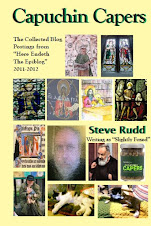It has been a busy week in the Holme Valley.
The snowdrops are still holding on, more daffodils are appearing even as I
type, there are now catkins coming out on the branches outside my bedroom
window, there is a brief haze of cherry blossom on a neighbour’s tree, and I
think there may even be tiny buds on our magnolia. Other than that of course, the rest of the garden
is a complete wasteland, redolent of Vimy Ridge or The Somme after the conflict
had swept over it and then moved on elsewhere.
Still, even some
signs of spring are welcome, and I found myself yet again thinking of Perdita’s
speech from A Winter’s Tale, about
Faire daffadils, that
come before the swallow dares,
And take the winds of
March with beauty.
I suppose, given that it’s somehow got to the 30th
day of March without me really noticing, that we are truly half way through
Lent and into those days described by the anonymous author of the 13th
century Harley Lyric:
Bythuene Mersh and
Averil
Whan spray beginneth
to springe…
There is quite a lot about daffodils in literature, even
without recourse to old Wordsworth nodding and dancing in the breeze. In fact
there is quite a lot about daffodils in A Winter’s Tale, because Autolycus also
sings about
When daffodils begin
to peer
With hey, the doxy,
o’er the dale…
But then, since the whole play can be read as an extended
metaphor, where spring stands for the concepts of redemption and possible
forgiveness, I suppose I shouldn’t be too surprised by this. I have been
spending my time drawing up plans for the garden, anyway, in the hope that – as
far as winter is concerned – that really is it for this year. It is still a
little early to hope, though – I’ve known snow at Easter before now and there
was once a Yorkshire v Derbyshire cricket match
at Buxton where snow stopped play in June.
Matilda has continued to welcome the advent of milder
weather, and has now settled down to a fairly set daily routine, inasmuch as a
cat can be said to have such a thing. First thing in the morning, when I come
into the kitchen, she will be curled up on the settee next to the stove, and
she often greets me with a short and unintelligible phrase in her own language.
I make a fuss of her and furfle her ears while I am mending up the stove, and
she retaliates by purring and head-butting me.
Eventually, she gets fed up of this, jumps off the cushion
and goes and sits by her dish in the conservatory, which is her way of asking
for her breakfast. Once she has stacked away a sachet of Felix, she then
proceeds to the first of her daily patrols around the decking. This can vary in
length from a few minutes to a whole day, depending on the weather. Or, if it’s
showery, she can be in and out like a fiddler’s elbow, necessitating frequent
trips to the door to allow her to come in or exit again.
By teatime, she’s normally got fed up of this and will come
in and curl up on the Maisie-blanket on “her” chair next to the television,
often remaining there until bedtime, when she gets fed again and then (usually)
takes up her place on the corner of the settee nearest the stove, as we’re all
going to bed. Once I’ve closed
everything up and turned the lights off, I commend her to the safe keeping of
St Gertrude of Nivelles, and wish her goodnight, and head off to my own repose.
Such are the days of Matilda, and I was struck in setting
that down by two things; one, how much of her daily routine is part of our
daily routine, even though we’ve only had her for 18 months, and secondly,
there are distinct similarities between greeting Matilda first thing in the
morning and greeting Debbie first thing in the morning: mainly the short
phrases in an unintelligible language, and the likelihood of being head-butted.
Misty Muttkins doesn’t really have a daily routine as such
her time is fairly randomly divided between eating, snoozing, walkies, and
trying to round things up, be it cats, other dogs (especially Freddie, but
since he wanders round aimlessly, in a completely gaga state for large parts of
the day, this is no bad thing) postmen, visiting authors and the coal man. It
is actually quite fascinating to watch her total self-absorption as she goes
into Border Collie sheepdog grandmother’s footsteps mode. The only way to
restore communication is to distract her, by waving a dog-treat. Apparently,
the Border Collie’s instinct to circle the flock and get round behind it was a
genetic trait originally belonging to wolves, who circle their prey, and was
selectively bred into the Border Collie breed over many hundreds of years,
taking a detrimental trait and gradually moulding and bending it to serve man’s
purpose in rounding up sheep.
Having said that, Misty’s complete ignorance of the standard
Border Collie commands (away, come by, etc) and her inability to fetch back
even a small stick might explain why she was initially turfed out of doors and
left to her own devices. I can’t see Northumbrian farmers being particularly
patient with, or tolerant of, a dog which, when you throw it a pebble on the
beach, comes back with a jellyfish (deceased).
On the dog-sheep scale though, we are at least progressing slightly.
We’ve gone from Tiggy, who was scared stiff of sheep and would actively go out
of her way to avoid them, to Misty, who has no idea what they are.
Of the unofficial members of our menagerie, there have still
been no definite sightings. Having sad that, the embryonic compost heap has
once more been eaten, as have the remaining potatoes that I was trying to get
to “strike” with their tubers. If it is Brenda the badger though, she sees to
be a darn sight more furtive this year than has hitherto been the case. It
could also be the foxes from Lockwood cemetery: we know they are there because
we used be able to lie in bed and hear them barking and snuffling and making
the most extraordinary sounds while mating, and once or twice we were able to
return the compliment. At the moment, all we can say is we have a mysterious
unidentified night-time visitor with a penchant for undercooked tuberous
vegetables.
My own week didn’t exactly pan out as I had hoped. I closed
last week’s Epiblog with the news that I felt that, as old daffodil-bonce
Wordsworth might have put it, the world was too much with me, late and soon…
and I was hoping to be able to set aside some time for quiet contemplation. The problem with deciding to do this is that,
unless you do a “Sister Wendy” and go off and live in a caravan in the woods,
it is quite difficult to disengage from the world, especially if the world
doesn’t want to disengage with you. So I
actually spent another week grappling with spreadsheets, figures, editing,
costings, corrections, Debbie’s pay arrears, et cetera, et cetera. I was up and
down like a dog at a fair, all week, with scarcely time to draw breath, let
alone pray. Plus, I have lost my rosary – well, not exactly lost it, I have a
pretty good idea where it got tidied away to, but it would take a major feat of
urban archaeology to uncover it.
So I think we can safely cross off the life of hermetic,
contemplative prayer, at least for last week. Maybe next week will be quieter,
who knows I don’t see it, myself, as I am at least three weeks behindhand with
everything this year, thanks to having to deal with the stock problems that
still keep rumbling round, like surprise thunder in spring, some of which we
also had this week.
There were, though, some moments where, though not exactly
quiet and contemplative, the battle paused for a while, and I was able to
savour something of special significance to me. The first of these was that, on
the herbs front, all is not lost. The
herbs in the troughs outside have had a hell of a pasting from the rain and
wind for weeks on end, over the winter. At least one of the troughs was
completely waterlogged for days. However – and this was the bit that cheered my
heart – the Comfrey, which I thought was dead as mutton, has forced a single,
trembling bright green spear of a leaf through the mould and mulch of last
winter, and is coming up again. The
Ladies’ Bedstraw, which had withered away to a few sticks, now also has new
green bits on it, and the Soapwort, which had died back to twigs, is now
putting forth green leaves again. Most startling was the Wood Avens, which
appeared, still green and growing, when I tipped the standing water off the
waterlogged trough: it appears, miraculously, to have continued growing
underwater all through the weeks of rain and gales.
Then there was the arrival of my portrait, by the late
Leslie Stettler. It had journeyed here all the way from Arizona, very kindly sent to me by her
widower, John. Leslie and I had started corresponding after I wrote a poem
about the Haserot Angel, the famous “weeping” monument in the Cleveland
cemetery in Ohio.
Leslie and her sister Christie were both Haserots before marriage. It began an
unlikely correspondence which ended up with her reading Here Endeth The Epilogue and painting the portrait. I never met
Leslie in real life, and the picture was done from a photograph. On seeing the
original portrait, I can't get over how she has just
"got" it. The photo it was done from was the one where Debbie always
said I looked "as if someone had just nicked my Cornish pasty", but
in fact, when it was taken in 2009, I was very ill at the time, and didn't know
it, and somehow - God knows how - Leslie has even sensed and captured that. Anyway, I felt very privileged to have it,
and it is stored away safely next door until such time as we can get it
properly put up on a wall. Orwell once famously wrote that by the time he was
fifty, a man had the face he deserved, and certainly, looking in the mirror in
the last few days before my 59th birthday, I can sympathise with
that sentiment, but now at least thanks to Leslie’s skill, I can have a sort of
reverse Dorian Gray effect, where the portrait stays ever youthful, and I get
ever older and more wrinkly.
Those were two oases of calm in
an otherwise hectic week, and the outside world has been hectic too, or so it
would seem. Talking of undercooked
tuberous vegetables, the Junta and the opposition have both been busy this
week. In fact, on Wednesday, it was becoming increasingly difficult to tell
them apart, when the parliamentary Labour party, with the exception of thirty
or so brave souls on the back benches who rebelled, shamefully voted in favour
of the Blight Brigade’s proposed benefits cap. This provoked a storm of
criticism from those who think (correctly, in my opinion) that it is Labour’s
job to shield the weakest in society and defend them from deplorable welfare
cuts. Forty or so key figures in the Labour movement and on the left signed a
letter critical of Miliband, and demanding that Labour must adopt new
principles, or face disaster in the 2015 election. Quite so. It must be FOR something,
and not just against the Tories. Actually, having said that, it should maybe
start by looking up the meaning of the word “opposition” in any reputable
dictionary.
I probably will end up holding my
nose and voting Labour, as they are the only ones with a realistic chance of
beating the Tories in Colne Valley, but I wish there was some way of adding
“this is in no way an endorsement of their shameful, lamentable, lacklustre,
weak, weasly, uncaring, stupid, careless, pathetic, vacuous, nebulous, and
quite often frankly idiotic, performance in opposition since 2010″ without
spoiling my vote. Plus, anyone can promise anything a year out from an
election. Look at last time Labour got in, when we ended up being saddled with
Tory spending plans that figured nowhere in the Labour manifesto.
In any case, until and unless Labour gets its act together, out there in front of voters who matter, this is all academic anyway. The Tories and UKIP will romp home on a tide of xenophobia and bigotry. Sadly, the party most likely to be the party that wins in 2015 would be the one that announces a complete moratorium on immigration and an immediate re-negotiation of our membership of the EU, which ain’t going to happen, but that’s what the white van men and racist pensioners think they want, and that’s what Labour has to counteract. Putting it bluntly, people who have spent the last four years listening to the mantra that there are too many brown people over here taking our jobs and houses, are not going to be impressed by a pledge to create new apprenticeships, for instance, laudable though that is.
Labour needs to stop aiming over people’s heads and target the issues that matter to people, and not concede the ground to the Tories (eg on an EU referendum) without a shot being fired. The wonks in charge of Labour policy may well think it’s lamentable that so many people have bigoted and erroneous opinions about immigration, as indeed it is, but nevertheless they DO hold these opinions, and unless Labour does something to correct and counteract this propaganda, starting NOW, in fact, starting YESTERDAY, other than just trying to be more Tory than the Tories, this lack of engagement with an issue which is seen (probably wrongly) as crucial to the electorate, and which is exploited mercilessly by UKIP, will be fatal to Labour in May 2015. Wake up!
In any case, until and unless Labour gets its act together, out there in front of voters who matter, this is all academic anyway. The Tories and UKIP will romp home on a tide of xenophobia and bigotry. Sadly, the party most likely to be the party that wins in 2015 would be the one that announces a complete moratorium on immigration and an immediate re-negotiation of our membership of the EU, which ain’t going to happen, but that’s what the white van men and racist pensioners think they want, and that’s what Labour has to counteract. Putting it bluntly, people who have spent the last four years listening to the mantra that there are too many brown people over here taking our jobs and houses, are not going to be impressed by a pledge to create new apprenticeships, for instance, laudable though that is.
Labour needs to stop aiming over people’s heads and target the issues that matter to people, and not concede the ground to the Tories (eg on an EU referendum) without a shot being fired. The wonks in charge of Labour policy may well think it’s lamentable that so many people have bigoted and erroneous opinions about immigration, as indeed it is, but nevertheless they DO hold these opinions, and unless Labour does something to correct and counteract this propaganda, starting NOW, in fact, starting YESTERDAY, other than just trying to be more Tory than the Tories, this lack of engagement with an issue which is seen (probably wrongly) as crucial to the electorate, and which is exploited mercilessly by UKIP, will be fatal to Labour in May 2015. Wake up!
The extent to which the insidious
all-pervasive message (which actually originated as Junta propaganda, until
they realised it was also unwittingly feeding support for UKIP and toned it
down) that there are too many brown people over here taking all our jobs and
houses has taken hold in the national psyche was demonstrated by the television
debate this week between Nigel Farage of UKIP and Nick Clegg of the Liberal
Turncoats. Clegg was predictably useless
and Farage trampled all over him, pausing only to reinforce the audience’s
prejudices with a few carefully-selected “facts”.
The thing is, though, that all
this “tough talking on immigration” and all this vying to crack down harder
than the next man, does have human consequences. Mariam Harley Miller, for
instance had her life turned upside down because the Home Office wants to
revoke her indefinite permission to stay in the UK. She’s lost her job, and now
will remain in limbo until her appeal is heard in August. Then we have the grotesque idiocy of Theresa
May hiring a private plane at the expense of the taxpayer in the middle of the
night in a botched attempt to deport Isa Muazu, despite his being too ill to
even stand up; we have Jimmy Mubenga, who unaccountably died while being
restrained by Border Agency contracted staff, on the flight which was trying to
deport him, though in his case we may yet see Justice meted out to those
responsible; and we have the case of four-year-old Assia Souhalia, dragged from
her bed at dawn to be deported along with her parents to an uncertain fate in
Algeria.
The list goes on. 39-year-old mother of two Ama Sumani,
deported to Ghana at the end of 2009, despite being under treatment for
terminal cancer, treatment which could not be continued there, where she died
shortly afterwards. That was in May
2010. You could be forgiven for thinking things had moved on since then, but
it’s not so: even as I type this, final
preparations are under way to deport Yashika Bageerathi from the Yarls Wood
detention centre, where she has been held since March 19th. She came to the UK as a
student, with her mother, younger brother and sister in 2011 to escape a
relative who was physically abusive. The family all claimed asylum last summer
but all four now face deportation, and because of Yashika’s age, her
application was considered separately from the rest of her family and she is facing
returning to Mauritius
alone, without any support network and family. A legal battle rages as I type.
And that’s not all: on Mother’s day, today, here in the UK,
perhaps we should be thinking about a mum who has been left to bring up her
daughter alone after her American husband was denied a return the country -
because he had cancer.
The Home Office ruled he had become a burden on the taxpayer and originally the NHS actually billed him £98,000 for the cancer treatment he had received so far. Lorraine Marx, 56, is now bringing her 10-year-old daughter Alexandra up alone, after her husband Ralph was forced to return to America despite having lived here for 13 years. Previously, Ralph’s lack of resident status meant that he had to re-apply at six monthly intervals, but as he was frequently abroad because of his work, it was never really an issue. When he was diagnosed with leukaemia in 2012, his hospital treatment meant he was at risk of over-staying his visitor status, so he surrendered his passport and applied for residency, at which point the Home Office rejected it and the NHS billed him!
His wife, a former Royal Navy chief petty officer, claims that when her husband was taken into hospital, he actually had private health cover, but was told that because his life was at risk his treatment would be on the NHS, even though she also pointed out that Ralph technically wasn't British.
A judge upheld the family's appeal in January, but the Home Office, unbelievably, is still wasting our money contesting this decision, and Ralph continues to live in America. As a result, the couple's daughter has seen her dad, who is now in remission, only once in the past year. The NHS has since dropped its demand for payment, but the Home Office spokesman said:
The Home Office ruled he had become a burden on the taxpayer and originally the NHS actually billed him £98,000 for the cancer treatment he had received so far. Lorraine Marx, 56, is now bringing her 10-year-old daughter Alexandra up alone, after her husband Ralph was forced to return to America despite having lived here for 13 years. Previously, Ralph’s lack of resident status meant that he had to re-apply at six monthly intervals, but as he was frequently abroad because of his work, it was never really an issue. When he was diagnosed with leukaemia in 2012, his hospital treatment meant he was at risk of over-staying his visitor status, so he surrendered his passport and applied for residency, at which point the Home Office rejected it and the NHS billed him!
His wife, a former Royal Navy chief petty officer, claims that when her husband was taken into hospital, he actually had private health cover, but was told that because his life was at risk his treatment would be on the NHS, even though she also pointed out that Ralph technically wasn't British.
A judge upheld the family's appeal in January, but the Home Office, unbelievably, is still wasting our money contesting this decision, and Ralph continues to live in America. As a result, the couple's daughter has seen her dad, who is now in remission, only once in the past year. The NHS has since dropped its demand for payment, but the Home Office spokesman said:
"We are appealing
the decision because we believe it did not apply the immigration rules
correctly. "Our family rules have been designed to make sure that those
coming to the UK
to join their spouse or partner will not become a burden on the taxpayer and
will be well enough supported to integrate effectively."
To which Ralph Marx replied:
To which Ralph Marx replied:
"We are not
scroungers. We can support ourselves and have done so all of our lives. But we
are being treated as criminals."
So the next time you hear a politician lying that they will
“get tough” and control immigration (you can tell they are lying, because their
lips are moving) just bear in mind that in reality, while we are part of the
EU, they can actually do very little about it, other than the sort of tinkering
around the edges that produces cases such as these. I am not arguing here for a
completely open door to immigration, either. I’d like to see a sensible
immigration policy, controlled by us, which is humanely applied and which
allows into this country people who can benefit the country and/or are willing
to work to do so. I’d also like to see some rigour and some intelligence put
into developing an alternative dialogue on the future of Europe,
other than UKIP’s simplistic “pull out and then send all the brown people
home.”
And the next time you hear some politician wittering on
about the finite resources, hard times, and austerity, ask them why there
aren’t enough houses, schools and hospitals to go round. What have we all been
paying our taxes for, all these years. When England was a bombed and smoking
wreck at the end of the last war, Atlee’s government managed to build, restore,
and house, school and treat everybody.
Replacing the social housing stock sold by Thatcher would also be a very
good way of kick starting the economy for real, without having recourse to the
sort of smoke and mirrors employed by Osborne.
You are unlikely to receive a sympathetic hearing,
though. Note the words of Ralph Marx,
who felt compelled, from his cancer sickbed, to deny that his family were
“scroungers”. Another of my correspondents, speaking to me this week, opined
that she was heartily sick of “hard working families”. As a single person who
has worked hard all her life and paid into the system, she wants to know where
the recognition is for her efforts, and points out how puritanical we have
become, with this idea of putting hard work above all other virtues. I’m not
afraid of hard work, personally, though it is often boring and frequently
unnecessary. If I was still employing
people, personally I’d want a range of talents. Yes, the ones who can grind it
out have their place, but so also do the people who sit and dream and maybe
have one good idea a day that either makes, or saves, the company a stack of
money. But to hear the likes of Mr Osborne, we are on a fast track back to the
days when you used to have to get up at four o’clock and pay’t mill owner for
permission to work!
The Mental Welfare Commission this week reported on the
tragic case of a woman in Scotland,
identified only as “Miss DE” for reasons of confidentiality, who took
her own life after failing an ATOS-administered Work Capability Assessment in
2011. When she was informed that her £94.25
per week Incapacity Benefit would be reduced to a Jobseekers’ Allowance of
£67.50 per week, she became very distressed and said she did not know how she
was going to pay her mortgage. She took an overdose on New Year’s Eve.
The chairman of the MWC, Dr Donald Lyons, said:
"This lady had a
lot to look forward to, she was getting married. She was being treated. She was
undertaking voluntary work. She had a good social network. There wasn't
anything else which we could identify that would lead us to believe that there
was any other factor in her life that resulted in her decision to end her
life."
No, quite. But then we live in barbaric times. The difference between the two rates of
benefit is £26.75 per week or £1391 a year. Such is the financial tightrope
many people are walking these days, and such is the value of a human life to
the pennypinching, cheeseparing DWP and its minions. It seems especially cheap
when you contrast it with the millions wasted by the same department on not
implementing the universal credit.
A correspondent of mine, a reader
of this blog, once asked me, “how do you find so much to complain about?” to
which my answer was that sadly, there is a never-ending stream, a litany of
cruelty, stupidity and injustice, most of it emanating from the Junta, the
Blight Brigade, our soi-disant rulers,
elders and betters.
Anyway, one way or another this week, we arrive wearily at
today, the Feast of St Osburga. Osburga was the 11th-century Abbess
of a convent in Coventry,
which had been originally been founded by King Canute, that well-known scourge
of typographers. Her shrine was a popular place of pilgrimage during medieval
times, because of the many miracles reported there. As usual with Saints at
such a distance in time from us now, there are several variations on this. For
a start, she was also known as Osburgh or Osburh, and at least one source
claims that the sketchy references which have come down to us, in various
documents and chronicles, are actually to a male Saint called “Osburn”. Other
accounts have Cnut attacking the
convent, rather than founding it! Some accounts give her feast day as January
21st. John Rous, writing in the 15th century, refers to
“the holy virgin Osburh” resting at Coventry cathedral, in a tomb possibly in
the south transept. She had a “noble shrine” apparently, and other references
are made to her head being “encased in silver and gold”. And, of course, to make things even more
obfuscatory, all of this refers to the old
Coventry
cathedral, burnt to a crisp in the blitz 1941 and reduced to the ruins which
now stand next to Sir Basil Spence’s replacement.
So, I don’t think there’s a lot here to detain us, as far as
St Osburga is concerned, noble, saintly, holy and pious as she undoubtedly must
have been. I could do with a few miracles myself next week, if she’s listening,
but other than that, I don’t really have a lot to say to her. I did contemplate making this blog about
Mothering Sunday, which was the Sunday half-way through Lent, when servants
were allowed time off to visit their mothers, and which became the more
commercial Mothers’ Day. It is painful
for me to write about this on two levels though – one being the obvious one
that my own mother is no longer with us, and – as next week’s birthday will
prove, if I am spared – I have now, myself, passed the age that she was when
she died, which feels a bit like sailing into uncharted waters. Also, a dear
friend of mine has a mum who is very ill at the moment, and if you are of a
praying bent or frame of mind, some positive vibes beamed in her direction
would be greatly appreciated. You may not know who she is, but if Big G is
doing his job, then he knows, and that’s all you need.
Other than that, I am looking forward to another week next
week very much like last week, if “looking forward to” is the correct
expression. I could, I suppose, carve out some of the peace and quiet I was
looking for by including a long list of my intended prayers in this blog,
except that subjecting you to a list of the names of the people on whom I wish
to call down God’s benison would quickly become boring. So, instead, I am just going to have to
soldier on, and hope for some quiet times in the battle ahead, to catch up on
my dialogue (or is it monologue?) with Big G.
I don’t know if he listens, but there is an old saying anyway about men
in battle that there are no atheists in foxholes. This is very true. In my experience, there
are just foxes in foxholes, listening in wonder to the strange sounds emanating
from semi-rural bedrooms.
Meanwhile, here in England, the nights are lighter, it
is still an hour to sunset, Debbie and the dogs are back from the cricket
field, the fire once again needs mending up, but the kettle is already singing
on the stove. We live in barbaric times,
but the Comfrey is thrusting out a green spear of hope. We are six jolly miners, we’re not worth a
pin, but when we get a bit o’coal, we’ll make the kettle sing!





















